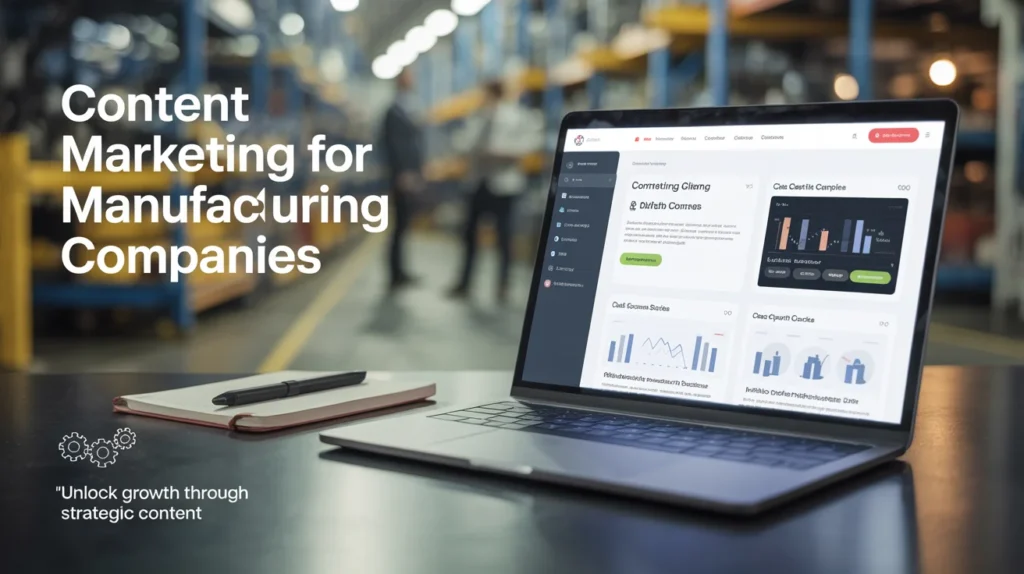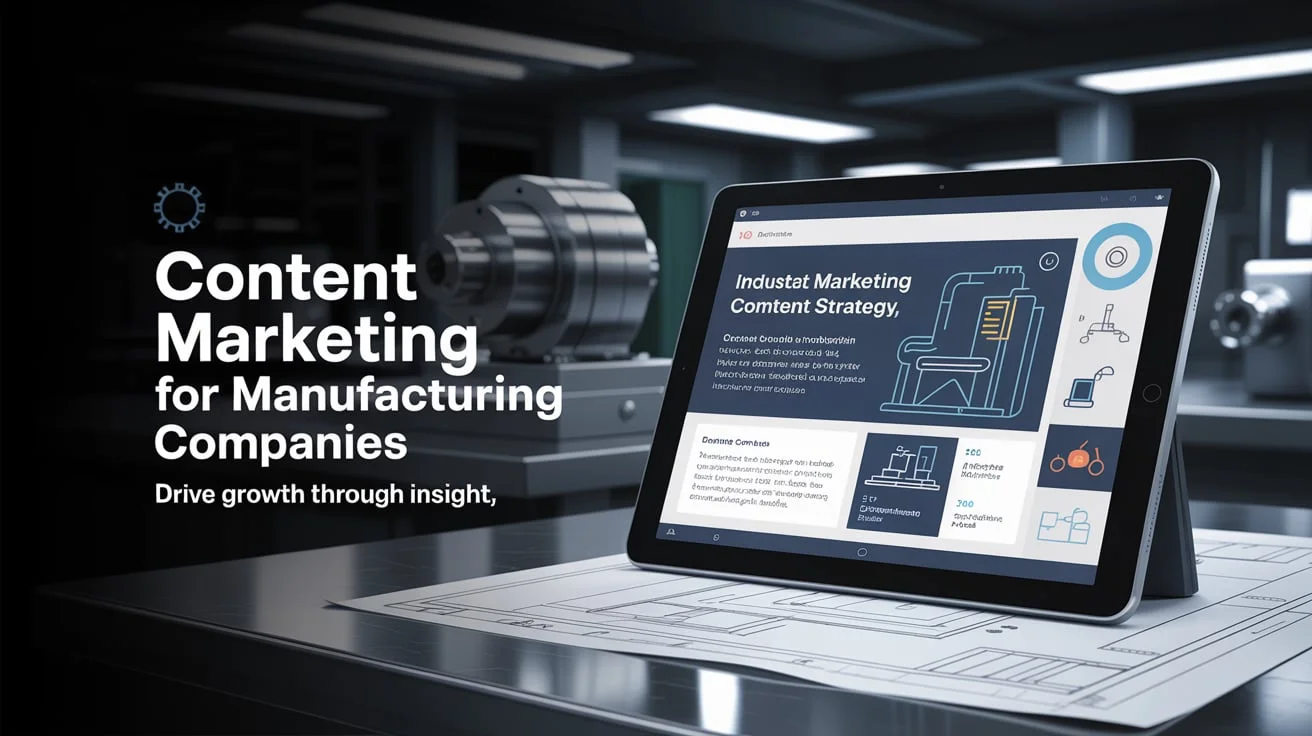Content marketing has become a vital strategy for businesses across all sectors. For manufacturing companies, it’s no different. The industrial sector is evolving, and so must the way manufacturers communicate with their customers and prospects.
In this comprehensive article, we will discuss content marketing for manufacturing companies, exploring how to do it effectively, the benefits, key strategies, and the tools to utilize.
Manufacturers face unique challenges, including the development of complex products, lengthy sales cycles, and technical audiences. However, content marketing offers a powerful way to build trust, educate customers, and generate leads by providing valuable information that meets their needs.
Understanding Content Marketing in Manufacturing
Before diving into strategies, it’s essential to understand what content marketing truly means for manufacturing companies. Unlike traditional advertising, content marketing focuses on creating and distributing valuable, relevant content to attract and engage a specific audience.
Manufacturing companies produce technical products that require detailed explanations and demonstrations of their benefits. Content marketing bridges the gap by providing targeted information through various channels, including blogs, videos, whitepapers, case studies, and more. It is about building relationships, not just selling.
Content marketing can help manufacturers educate their audience about complex products and solutions. Moreover, it helps showcase expertise and innovation while improving brand visibility online. Therefore, it serves as a tool for generating qualified leads that are more likely to convert.
Why Content Marketing is Crucial for Manufacturing Companies
The manufacturing sector has traditionally relied on trade shows, direct sales, and word-of-mouth marketing. Today, buyers often research online before even contacting a supplier. This shift requires manufacturers to have a strong online presence, and content marketing is the key to achieving that.
Manufacturing companies often have long sales cycles and complex buying processes. Content marketing supports these by nurturing prospects over time and providing valuable touchpoints at every stage of the buyer’s journey.
Some significant reasons content marketing matters include:
- Enhanced SEO and Online Visibility: Content enables manufacturers to appear in search results for relevant queries, thereby driving organic traffic.
- Lead Generation: Quality content attracts interested prospects who download materials or sign up for newsletters.
- Brand Authority: Publishing in-depth technical articles and case studies positions the company as an industry leader.
- Customer Retention: Ongoing content keeps current customers engaged and informed.
How to Create a Content Marketing Strategy for Manufacturing Companies
Creating a strategy tailored to manufacturing requires understanding your audience, their pain points, and the buying process.
Here’s a step-by-step guide:
Step 1: Define Your Target Audience
Manufacturers serve various industries and roles. It is essential to identify who your content is for, whether it’s engineers, procurement managers, plant operators, or executives. Knowing this helps you tailor your message to meet their specific needs and challenges.
Step 2: Map the Buyer’s Journey
Understanding the stages of the buyer’s journey, awareness, consideration, and decision, is critical. You should create content tailored to each stage, ranging from blog posts that explain the problems customers face to case studies that demonstrate tangible results and solutions.
Step 3: Choose Content Types
Manufacturing audiences respond well to detailed and technical content formats. These include technical blog posts that address specific industry challenges, whitepapers and eBooks that provide in-depth knowledge, product videos and demos that visually explain product features, webinars and podcasts that engage through interactive discussions, and customer case studies that highlight successful applications of your products.
Step 4: Create a Content Calendar
It’s essential to plan your publishing frequency and topics. A content calendar helps you maintain a steady flow of content that is aligned with your business goals and marketing campaigns.
Step 5: Promote Your Content
Once your content is ready, actively share it on platforms such as LinkedIn and industry-specific forums. Use email newsletters to reach your existing contacts, and apply SEO tactics to increase your content’s visibility and reach a broader audience.
Essential Content Types for Manufacturing Companies
Manufacturing companies should focus on content formats that clearly explain their products and solutions. Blogs provide short, informative articles targeting common problems or industry trends, like “How to Maintain Industrial Pumps Efficiently.”
Whitepapers offer in-depth reports providing technical insights and solutions, making them ideal for lead generation.
Videos demonstrate equipment in action or feature customer testimonials, which help build trust and visually explain complex products.
Case studies present real-world examples that demonstrate how your product addresses a customer’s problem, while infographics simplify complex data into visual formats for quick understanding.
Each type has distinct benefits. Blogs enhance SEO and provide quick answers to common questions. Whitepapers capture leads through gated downloads.
Videos increase engagement and shareability. Case studies demonstrate expertise with social proof, and infographics make complex technical details more digestible.
How to Optimize Content Marketing for SEO in Manufacturing
SEO is essential for making your content visible on search engines. For manufacturing companies, optimizing SEO means understanding what your audience searches for and using those terms thoughtfully. This helps improve your site’s ranking, attract exemplary visitors, and grow your business.
Here’s how manufacturing companies can optimize their content for SEO.
- Keyword Research: Use terms your audience searches for, like “industrial automation solutions” or “manufacturing process optimization.”
- On-Page SEO: Optimize titles, meta descriptions, headers, and images.
- Semantic SEO: Use related keywords and natural language to help Google understand context.
- Content Quality: Create well-researched, detailed, and original content.
- Mobile-Friendly Design: Ensure your content looks good on all devices.
- Internal Linking: Connect related content pieces to keep users engaged longer.
Common Challenges in Manufacturing Content Marketing and Solutions
Manufacturers often face obstacles when implementing content marketing. One common challenge is explaining complex products. To overcome this, break down complicated ideas into simpler language and support them with visuals.
Long sales cycles also present difficulties, but producing content for every stage of the buyer’s journey helps maintain engagement throughout the process.
Limited marketing resources can restrict output, so focusing on quality over quantity and repurposing content can be an effective strategy.
Finally, the technical nature of manufacturing audiences demands accuracy and detail in content, so always ensure your materials are fact-checked and relevant.
Measuring Success in Manufacturing Content Marketing
To know if your content marketing efforts are paying off, track key metrics such as website traffic, page views, lead generation, and conversion rates. Engagement metrics, such as average time on page and shares, indicate how well your audience is interacting with your content.
SEO rankings for target keywords help you understand visibility improvements, and feedback from sales teams about the quality of leads generated through content provides practical insights. Regularly analyzing these metrics with tools like Google Analytics allows you to refine your strategy for even better results.
Top Content Marketing Tools for Manufacturing Companies

Using the right tools can make content marketing easier and more effective for manufacturing companies. These tools help with everything from keyword research to content creation, distribution, and tracking results.
Tools for Manufacturing Companies
- SEO tools like SEMrush, Ahrefs, and Moz assist in keyword research and competitor analysis, helping you find the best terms to target.
- Content management systems such as WordPress and HubSpot make publishing and organizing your content simple and efficient.
- Analytics platforms, such as Google Analytics, provide valuable insights into website traffic and visitor behavior.
- Design tools like Canva and Adobe Creative Suite help create professional visuals that enhance your content’s appeal.
- Email marketing services such as Mailchimp and ActiveCampaign support lead nurturing and customer engagement through targeted campaigns.
Together, these tools cover the key areas needed for a successful content marketing strategy. By leveraging them, manufacturing companies can produce high-quality content, reach the right audience, and measure their marketing effectiveness with ease.
Conclusion:
Content marketing for manufacturing companies is no longer optional; it’s a business imperative.
As digital transformation continues to shape the industrial sector, manufacturers who invest in high-quality, targeted content will attract more business, build stronger customer relationships, and maintain a competitive edge.
By understanding their audience, creating strategic and valuable content, and optimizing for search engines, manufacturers can fully leverage the benefits of content marketing to grow and succeed.
Frequently Asked Questions:
Q1: What is content marketing for manufacturing companies?
Content marketing means creating and sharing helpful content to attract and engage industrial buyers.
Q2: Why is content marketing important in manufacturing?
It builds trust, educates customers, improves SEO, and generates qualified leads.
Q3: What content types work best for manufacturers?
Blogs, whitepapers, videos, case studies, and infographics are most effective.
Q4: How do manufacturing companies measure content marketing success?
By tracking website traffic, lead generation, engagement, and SEO rankings.
Q5: Can manufacturing companies do content marketing with limited resources?
Yes, by focusing on quality, repurposing content, and using the right tools.



